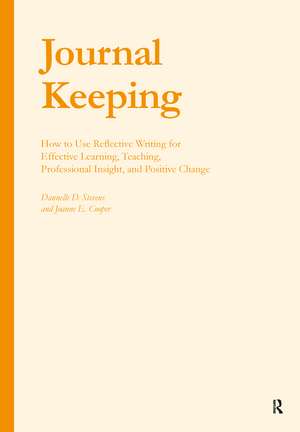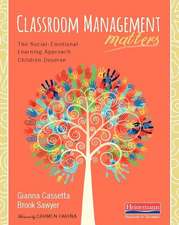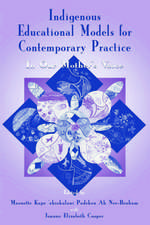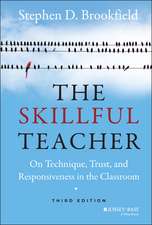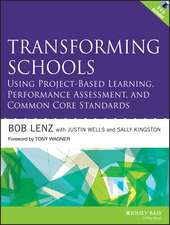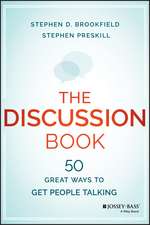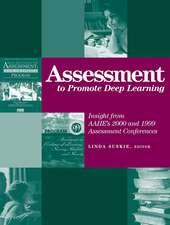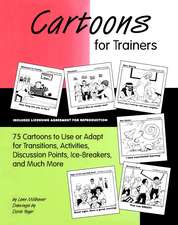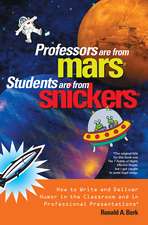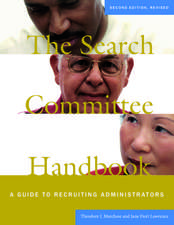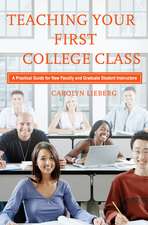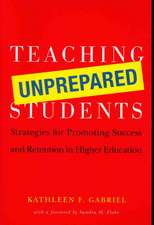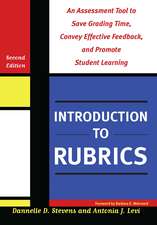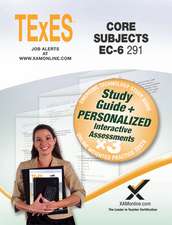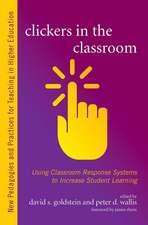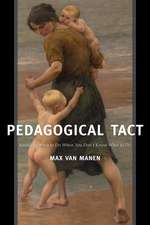Journal Keeping: How to Use Reflective Writing for Learning, Teaching, Professional Insight and Positive Change
Autor Dannelle D. Stevens, Joanne E. Cooperen Limba Engleză Hardback – 3 iun 2009
| Toate formatele și edițiile | Preț | Express |
|---|---|---|
| Paperback (1) | 253.94 lei 43-57 zile | |
| Taylor & Francis – 21 apr 2009 | 253.94 lei 43-57 zile | |
| Hardback (1) | 1168.00 lei 43-57 zile | |
| Taylor & Francis – 3 iun 2009 | 1168.00 lei 43-57 zile |
Preț: 1168.00 lei
Preț vechi: 1229.48 lei
-5% Nou
Puncte Express: 1752
Preț estimativ în valută:
223.49€ • 233.97$ • 184.93£
223.49€ • 233.97$ • 184.93£
Carte tipărită la comandă
Livrare economică 07-21 aprilie
Preluare comenzi: 021 569.72.76
Specificații
ISBN-13: 9781579222154
ISBN-10: 1579222153
Pagini: 286
Dimensiuni: 178 x 254 x 20 mm
Greutate: 0.68 kg
Ediția:1
Editura: Taylor & Francis
Colecția Routledge
Locul publicării:Oxford, United Kingdom
ISBN-10: 1579222153
Pagini: 286
Dimensiuni: 178 x 254 x 20 mm
Greutate: 0.68 kg
Ediția:1
Editura: Taylor & Francis
Colecția Routledge
Locul publicării:Oxford, United Kingdom
Public țintă
Postgraduate and Professional Practice & DevelopmentCuprins
Tables and Figures; Acknowledgements; Preface; PART ONE. JOURNAL WRITING AND ITS THEORETICAL FOUNDATIONS 1. Journal Writing. Definition and Rationale; 2. Reflection and Learning from Experience; 3. Reflection and Adult Development Theory; PART TWO. USING JOURNALS IN CLASSROOMS AND PROFESSIONAL LIFE 4. Introducing and Structuring Classroom Journal Writing; 5. Classroom Journal-Writing Techniques; 6. Grading Classroom Journal Writing; 7. Journal Writing in Professional Life; 8. Journal Writing in the Computer Age—Rebecca L. Schulte; PART THREE. A COLLECTION OF CASE STUDIES. TEACHING WITH JOURNALS AND KEEPING JOURNALS IN PROFESSIONAL LIFE 9. Case Studies. Teaching With Journals; 10. Case Studies. Journal Keeping in Professional Life; Afterword; Appendices. A. Journal Writing Techniques; b. Contributor Contact Information; References; Index.
Notă biografică
Dannelle D. Stevens is a tenured professor in the Department of Curriculum and Instruction at Portland State University in Oregon where she has been since 1994. Her roots, however, are in the public school classroom where she taught middle school and high school social studies, language arts, and special education for 14 years across four school districts and three states. She received her master's from the University of Utah in 1983, and a doctorate in educational psychology from Michigan State in 1991. Before coming to PSU she taught at Whitman College in Walla Walla, Washington. Whether the topic is rubrics, journal writing, action research or academic writing, her work centers on how adults reflect on what they do and, then, act on those reflections. One of Dr. Stevens' underlying assumptions is that cognitive, social and emotional development does not end with the teenage years but continues through the lifetime. Besides over 75 conference presentations, she has written three books, all designed to impact development of her fellow faculty and their students. Her first book, co-edited with Joanne Cooper, Tenure in the Sacred Grove: Issues and Strategies for Women and Minorities, (SUNY Press, 2002), was written to help faculty women and minorities negotiate the path to tenure. Introduction to Rubrics, now in its second edition, and co-authored with Antonia J. Levi, and Journal Keeping, co-authored with Joanne Cooper, are both published by Stylus Publishing. In addition to teaching classes, she has taken on leadership positions in the department and campus-wide. In the Curriculum and Instruction Department, Dr. Stevens leads teacher licensure cohorts and coordinates the MA/MS program for experienced teachers. For the university at large, she works within the Center for Academic Excellence as faculty-in-residence for assessment. She is chair of the Institutional Assessment Council. Joanne E. Cooper is a Professor in the Department of Educational Administra
Recenzii
"Dannelle Stevens and Joanne Cooper have written a comprehensive yet accessible book on the pleasures and challenges of using journals to support reflective learning... This is the book I wish that I'd had years ago when I first started experimenting with journals in my classes. I commend it highly, and believe it has the potential to bring journaling into more widespread and effective practice in reflective learning."
Mary E. Hess, Luther Seminary
Teaching Theology and Religion
"This work presents background on the value of journals so that readers can determine whether journals will fit appropriately with their teaching objectives or help them manage their personal and professional lives... A collection of 19 case studies of journals by faculty, graduate students, and administrators is illustrated with b&w photos, illustrations, and pages from real-life handwritten journals."
Book News Inc.
"As mentioned, this book has lots in it about journaling. If you are new to the idea and want an excellent introduction, the material is here... I could see having this book on the shelf of an EDC or in a library, as it is bound to benefit people interested in learning more about journals and/or addressing specific issues pertinent to the broad area at a pedagogical level... In summary, I comment the book on the whole as one that belongs in a resource center to support teaching and learning."
EDC Resource Review
"Journal Keeping makes a clear and compellig argument for what the authors call an "underused and sometimes misunderstood" (xv) educational tool... The book makes a theoretically sound, logistically solid, and ultimately persuasive argument for the keeping of journals."
The Review of Higher Education
"Dannelle Stevens and Joanne Cooper bring years of personal and professional experience with journal writing to inform the content of their book. This fact creates a level of credibility to their writing, and their approach to the material makes reading the text feel like a converstation with trusted friends. The intent of their volume is to explain the use of journaling in teaching and how to keep a journal to help organize professional lives. Therefore, this book should appeal to a variety of academic readers including faculty members, students, staff and administrators. In addition, both the novice and seasoned journal writer should find several takeaways... Among the several strengths of the book is the potential for immediate application of journal writing strategies to support active learning... Journal Keeping should be on everyone's short list. The writing is approachable, the book well organized and the material easy to implement in practice. Rarely have I found a book that I have been so enthusiastic about and that I highly recomment to others."
Community College Review
"Making a written record of our lives, experiences, and thoughts often helps us to understand them better, provide an emotional relief, memorialize accomplishments, benefi our posterity, and estbalish the only kind of immortality that most of us can hope for. That's why Journal Keeping is such an invaluable and highly recommended instructional manual for aspiring diarists and journalists... It is a highly recommended addition to personal, professional, academic, and community library reference collections and supplemental reading lists."
Midwest Book Review
"Journal Keeping is a superb tool for educators who want to be reflective practitioners, and help their students become reflective learners. But it is not a typical 'how-to' text, as the epigraph to Chapter 1 suggests: 'The unexamined life is not worth living.' Elaborating on Socrates, Stevens and Cooper explore the rationale, process and impact of journal keeping on educators and students alike, helping us overcome familiar obstacles; e.g., 'How can you possibly evaluate a student journal?' As one who likes to amend Socrates with the words, 'If you choose to live an unexamined life, please do not take a job that involves other people,' I hope this fine book will be widely read and used."
Parker J. Palmer
author of “The Courage to Teach,” “Let Your Life Speak” and “A Hidden Wholeness”
“This book describes a practical strategy for promoting learning and thinking artfully grounded in adult development and learning theory. Stevens and Cooper remind readers that reflection is a key element of learning and offer multiple ways to reflect meaningfully through journaling. They use their own and others’ journal entries to reveal how journaling helps reflect on one’s experience, develop one’s internal voice through making meaning of experience, transform one’s assumptions and knowledge, and organize and communicate one’s perspective. They offer multiple possibilities for readers to use journaling for personal growth, fostering their own and others’ learning, and managing professional life.”
Marcia B. Baxter Magolda, Professor Emerita
Miami University of Ohio and author of Authoring Your Life
“An impressively complete and well organized exploration of the uses of journal writing. It provides rich backing for John Dewey’s key insight, namely that it’s not experience that makes us learn, it’s reflection on experience."
Peter Elbow
author of Writing with Power, and Everyone Can Write, and Professor Emeritus, University of Massachusetts, Amherst
“Over the course of human history, when we study individuals who have made a significant difference in our lives, we discover that the key to their own self-discovery, growth, and resilience is their journal keeping. We call them ‘geniuses,’ whether Aristotle, Leonardo da Vinci, Wordsworth (Dorothy as well as William), John Muir, Einstein, Gertrude Stein, Thoreau, Ansel Adams, Thomas Jefferson, Abraham Lincoln, or Barack Obama. Presidents, scientists, artists, all came to their purpose and power through the reflective practice of writing a journal. Read this book for real-life lessons on the power of journals for your own professional and creative life. You will be inspired to write and I promise you, whatever you write, in whatever format, will transform your moment, make your day, and change – who knows, perhaps save – your life.”
Barbara Mossberg, President Emerita
Goddard College, Senior Scholar James McGregor Burns Academy of Leadership, and Director and Professor Integrated Studies, California State University Monterey Bay
"Most historians consider personal journals as excellent primary sources, but few of my colleagues are familiar with using them as a core component of student assessment. In Journal Keeping: How to Use Reflective Writing for Learning, Teaching, Professional Insight and Positive Change (Stylus, 2009), Dannelle D. Stevens and Joanne E. Cooper lay out the argument that course journals give students not merely a place to put notes, but they also create a space for instructor-directed reflection on learning. Current research makes it clear that taking knowledge and connecting it with one’s own experience significantly improves retention of that knowledge.
Stevens and Cooper discuss a wide range of possible uses: asking students to write out summaries of the main points of each lecture at its conclusion, writing five-minute reflections after discussions, logging progress on class projects, going back to earlier entries and annotating or updating with new ideas, and so on. They also suggest a number of ways to make journal grading a breeze."
Inside Higher Ed
Mary E. Hess, Luther Seminary
Teaching Theology and Religion
"This work presents background on the value of journals so that readers can determine whether journals will fit appropriately with their teaching objectives or help them manage their personal and professional lives... A collection of 19 case studies of journals by faculty, graduate students, and administrators is illustrated with b&w photos, illustrations, and pages from real-life handwritten journals."
Book News Inc.
"As mentioned, this book has lots in it about journaling. If you are new to the idea and want an excellent introduction, the material is here... I could see having this book on the shelf of an EDC or in a library, as it is bound to benefit people interested in learning more about journals and/or addressing specific issues pertinent to the broad area at a pedagogical level... In summary, I comment the book on the whole as one that belongs in a resource center to support teaching and learning."
EDC Resource Review
"Journal Keeping makes a clear and compellig argument for what the authors call an "underused and sometimes misunderstood" (xv) educational tool... The book makes a theoretically sound, logistically solid, and ultimately persuasive argument for the keeping of journals."
The Review of Higher Education
"Dannelle Stevens and Joanne Cooper bring years of personal and professional experience with journal writing to inform the content of their book. This fact creates a level of credibility to their writing, and their approach to the material makes reading the text feel like a converstation with trusted friends. The intent of their volume is to explain the use of journaling in teaching and how to keep a journal to help organize professional lives. Therefore, this book should appeal to a variety of academic readers including faculty members, students, staff and administrators. In addition, both the novice and seasoned journal writer should find several takeaways... Among the several strengths of the book is the potential for immediate application of journal writing strategies to support active learning... Journal Keeping should be on everyone's short list. The writing is approachable, the book well organized and the material easy to implement in practice. Rarely have I found a book that I have been so enthusiastic about and that I highly recomment to others."
Community College Review
"Making a written record of our lives, experiences, and thoughts often helps us to understand them better, provide an emotional relief, memorialize accomplishments, benefi our posterity, and estbalish the only kind of immortality that most of us can hope for. That's why Journal Keeping is such an invaluable and highly recommended instructional manual for aspiring diarists and journalists... It is a highly recommended addition to personal, professional, academic, and community library reference collections and supplemental reading lists."
Midwest Book Review
"Journal Keeping is a superb tool for educators who want to be reflective practitioners, and help their students become reflective learners. But it is not a typical 'how-to' text, as the epigraph to Chapter 1 suggests: 'The unexamined life is not worth living.' Elaborating on Socrates, Stevens and Cooper explore the rationale, process and impact of journal keeping on educators and students alike, helping us overcome familiar obstacles; e.g., 'How can you possibly evaluate a student journal?' As one who likes to amend Socrates with the words, 'If you choose to live an unexamined life, please do not take a job that involves other people,' I hope this fine book will be widely read and used."
Parker J. Palmer
author of “The Courage to Teach,” “Let Your Life Speak” and “A Hidden Wholeness”
“This book describes a practical strategy for promoting learning and thinking artfully grounded in adult development and learning theory. Stevens and Cooper remind readers that reflection is a key element of learning and offer multiple ways to reflect meaningfully through journaling. They use their own and others’ journal entries to reveal how journaling helps reflect on one’s experience, develop one’s internal voice through making meaning of experience, transform one’s assumptions and knowledge, and organize and communicate one’s perspective. They offer multiple possibilities for readers to use journaling for personal growth, fostering their own and others’ learning, and managing professional life.”
Marcia B. Baxter Magolda, Professor Emerita
Miami University of Ohio and author of Authoring Your Life
“An impressively complete and well organized exploration of the uses of journal writing. It provides rich backing for John Dewey’s key insight, namely that it’s not experience that makes us learn, it’s reflection on experience."
Peter Elbow
author of Writing with Power, and Everyone Can Write, and Professor Emeritus, University of Massachusetts, Amherst
“Over the course of human history, when we study individuals who have made a significant difference in our lives, we discover that the key to their own self-discovery, growth, and resilience is their journal keeping. We call them ‘geniuses,’ whether Aristotle, Leonardo da Vinci, Wordsworth (Dorothy as well as William), John Muir, Einstein, Gertrude Stein, Thoreau, Ansel Adams, Thomas Jefferson, Abraham Lincoln, or Barack Obama. Presidents, scientists, artists, all came to their purpose and power through the reflective practice of writing a journal. Read this book for real-life lessons on the power of journals for your own professional and creative life. You will be inspired to write and I promise you, whatever you write, in whatever format, will transform your moment, make your day, and change – who knows, perhaps save – your life.”
Barbara Mossberg, President Emerita
Goddard College, Senior Scholar James McGregor Burns Academy of Leadership, and Director and Professor Integrated Studies, California State University Monterey Bay
"Most historians consider personal journals as excellent primary sources, but few of my colleagues are familiar with using them as a core component of student assessment. In Journal Keeping: How to Use Reflective Writing for Learning, Teaching, Professional Insight and Positive Change (Stylus, 2009), Dannelle D. Stevens and Joanne E. Cooper lay out the argument that course journals give students not merely a place to put notes, but they also create a space for instructor-directed reflection on learning. Current research makes it clear that taking knowledge and connecting it with one’s own experience significantly improves retention of that knowledge.
Stevens and Cooper discuss a wide range of possible uses: asking students to write out summaries of the main points of each lecture at its conclusion, writing five-minute reflections after discussions, logging progress on class projects, going back to earlier entries and annotating or updating with new ideas, and so on. They also suggest a number of ways to make journal grading a breeze."
Inside Higher Ed
Descriere
This book presents the potential uses and benefits of journals for personal and professional development—particularly for those in academic life; and demonstrates journals’ potential to foster college students’ learning, fluency and voice, and creative thinking.
